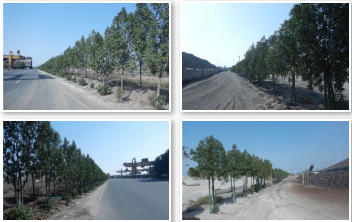Aligned with the National Biodiversity Strategy and Action Plan 2015-2025, Qatar Steel is dedicated to preserving Qatar’s natural environment. We implement stringent measures, such as engaging consultants and conducting extensive studies, to ensure our operations occur in areas with low biodiversity value, minimizing potential harm. Our Sustainability Policy also underscores our commitment to biodiversity protection.
Our facility operates in an area primarily intended for industrial usage, with no natural habitats, reserves, or sanctuaries in close proximity, except for the nearby sea. There are two ports, namely the MIC Mesaieed Industrial City Port and Qatar Steel’s Port close to our boundaries and the activities of both are conducted in alignment with Qatar’s environmental laws, preventing any detrimental activities.
Environmental Impact Assessment studies conducted prior to new projects have consistently indicated that the area surrounding our plant has low environmental significance and thus a low potential for environmental impacts. To further ensure ecological safety, ecotoxicity studies are conducted whenever new materials are procured.
A comprehensive Biodiversity Impact Assessment conducted annually confirms that our operations do not occur in areas of high biodiversity value and do not pose a harmful impact on regional biodiversity. Nonetheless, we have taken several proactive measures to enhance biodiversity within our premises. In 2021 we undertook a tree plantation initiative, planting around 139 native tree species (Ziziphus spina-christi, Acacia Tortilis and Mesquites) that can thrive in Qatar’s local climate. In 2022, we hired a third-party contractor to continue the plantation activity and in 2023 around 1500 trees were planted. Qatar Steel will continue its tree plantation drive and in 2024, there is a plan to plant around 700 trees around the premises.

Furthermore, a study commissioned in 2021 assessed the ecotoxicity of substances used in our plants, identifying Sodium Tetraborate and Titanium Oxide as the only substances of concern. Periodic analysis of seawater and groundwater confirms that these substances remain below detection limits, and regular inspections and audits ensure proper disposal of empty chemical containers.
As per the consent to operate and other regulatory requirements and guidelines applicable, Qatar Steel is monitoring the emissions, conducting environmental studies, and submitting the reports to the MoECC and local authority at QatarEnergy-MIC. There weren’t any raised reports regarding the negative impacts of Qatar Steel’s plant on society or biodiversity. Most of the company’s environmental emissions are within the consent to operate assigned limits of Qatar’s MoECC for analysis of gases, particulate matters, blown down water (processed water) discharge analysis, noises, and other environmental factors.
To provide the best experiences, we use technologies like cookies to store and/or access device information. Consenting to these technologies will allow us to process data such as browsing behavior or unique IDs on this site. Not consenting or withdrawing consent, may adversely affect certain features and functions.



 Employee Portal
Employee Portal


